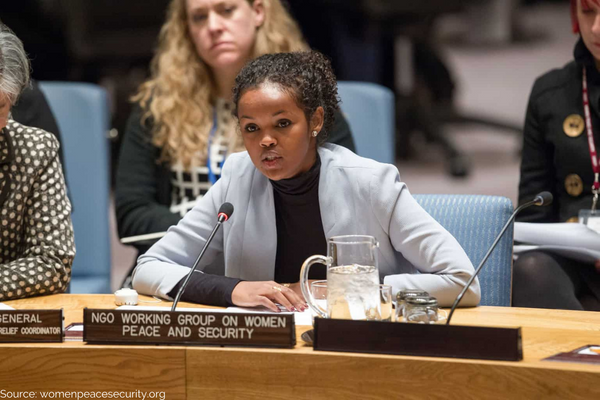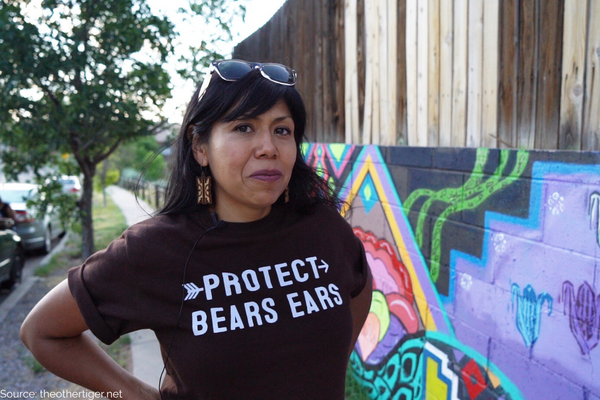We find it is important to seek inspiration every day, no matter what is going on. But this past year especially, we've found much needed hope and inspiration from so many women worldwide. We’ve witnessed millions of female activists rise up to support frontline healthcare workers, racial justice, democracy, and climate justice. So we propose taking a moment to celebrate all their hard work (and maybe find a new activist role model along the way).
Here are ten amazing female activists we've chosen to highlight. In keeping with this year’s International Women’s Day theme #ChooseToChallenge, we picked women who have been challenging oppressive systems to make life better for everyone in their countries. From poet laureate Amanda Gorman to disability activist Alice Wong, these women have done a lot worth celebrating!
1. Amanda Gorman

Amanda Gorman has become a household name since the presidential Inauguration, but she’s been using her poetry to further her activist beliefs for years. In 2016, she founded the youth writing and leadership program One Pen One Page. And on that page, her poetry tackles issues of oppression, feminism, race and marginalization, and the African diaspora with critical thinking and hope. A self-proclaimed history buff, Gorman has already made history multiple times, but hopes to do it again in 2036 when she plans to run for president herself.
“Quiet isn’t always peace, and the norms and notions of what just is, isn’t always justice.” - Amanda Gorman
2. Panusaya Sithijirawattanakul

Student Panusaya Sithijirawattanakul rose to prominence last fall when she spoke out against the monarchy at several large student demonstrations in Bangkok. Volunteering to read the student activist group’s now famous list of 10 demands put Sithijirawattanakul in the spotlight. The demands cover a range of topics, but most focus on strengthening Thailand’s democracy and constitution and diminishing the power of the monarchy. Even braver, due to an old and mostly unenforced Thai law, Sithijirawattanakul risked up to 15 years of jail time for speaking up. It is beautiful to see passionate female activists like Sithijirawattanakul speak truth to power and demand the democratic protections of free speech.
“Everyone is a world-changer. No matter what you do or who you are, be confident and make your life worth it.” - Panusaya Sithijirawattanakul
3. Rima Sultana Rimu

As a member of 'Young Women Leaders for Peace,' Rima Sultana Rimu has been recognized for her outstanding work providing educational resources for women and children in Rohingya refugee camps in her native Bangladesh. Using radio broadcasts and theatre performances as well as more traditional classroom teaching methods, Rimu spreads awareness of the UN Security Council's recommendations on women, peace and security. She also serves as a resource for members of the Rohingya community facing issues like child marriage, dowry and domestic violence. It’s wonderful to see feminist activists like Rimu getting the recognition they deserve.
“I am determined to bring gender equality to Bangladesh. I believe in the power of women and girls to fight for our rights. We will succeed.” - Rima Sultana Rimu
4. Alice Wong

Longtime disability rights activist Alice Wong was very busy in 2020, the thirty-year anniversary of the passage of the Americans with Disabilities Act. Wong capitalized upon the media attention around the release of her new book “Disability Visibility: First-Person Stories from the Twenty-First Century” to be a vocal advocate for the dignity and inherent worth of disabled people’s lives during the coronavirus. In the midst of widespread racial justice protests in July, she also published and edited #ADA30InColor, a series of essays by disabled people of color. Alice Wong is definitely a female activist to keep an eye on in the coming years.
“The reality of disability and joy means accepting that not every day is good but every day has openings for small pockets of joy.” - Alice Wong
5. Ilwad Elman

One of the leading voices and most prominent women’s rights activists today in Somalia, Ilwad Elman was recently awarded the German Africa Prize for her work on conflict resolution and gender justice. Elman Peace, the nonprofit she runs with her mother, operates many programs that promote peace, including Sister Somalia, the country’s first rape crisis center, and Drop the Gun Pick up the Pen, a campaign against the recruitment of child soldiers. It is inspiring and exciting to see her leadership in these times.
“The pandemic gave the world a crash course in empathy. We witnessed women lead where others have failed. Women in leadership must no longer be deemed an optional second, but a fundamental priority.” - Ilwad Elman
6. Dr. Christina M. Castro

Dr. Christina M. Castro and the organization she helped found, the Three Sisters Collective, worked hard to support the Indigenous Santa Fe community through many challenges this year. When COVID hit, she helped organize a fundraiser for native families experiencing hardship. During the rough fire season, her organization members came together to purchase and distribute air purifiers and water for native families struggling with the air quality. Throughout these challenges, she worked tirelessly on the Three Sisters Collective’s mural project that protects existing Indigenous artwork in Sante Fe and is creating additional murals to celebrate Indigenous culture and people in the area.
“If you look at the way things are going now, it would behoove us to learn to live in harmony with the earth. I think this is the survival of the next era — learning to reconnect with the earth and the land and honor the places we inhabit” - Dr. Christina M. Castro
7. Rachel Cargle

After moving to New York City, Black feminist activist Rachel Cargle wanted to keep a connection with her native Akron, Ohio. Out of this desire, Elizabeth’s Bookshop and Writing Center was born. Elizabeth’s is designed to celebrate marginalized voices and will be a cultural center for the Akron community once indoor gathering is safe again. All proceeds of this social activists project go towards Cargle’s nonprofit the Loveland Foundation that makes mental healthcare accessible to Black women and girls.
“We try to give readers a map for ways they can bring more marginalized voices into their bookshelves.” - Rachel Cargle
8. Lorella Praeli

As the Vice President of Community Change, Peruvian-born social activist Lorella Praeli has been focused on challenging the U.S.’s immigration policies. In the last decade, she’s helped implement the DACA and DAPA programs that protect undocumented Americans from deportation. And now, she’s at the forefront of conversations around plans to create a shorter path to citizenship available. Her efforts to provide hope and stability to millions of undocumented Americans make her one of the activists today most worth watching.
“There are no shortcuts to building power and winning transformative policy change for all people.” - Lorella Praeli
9. Nina Gualinga

One of the most visible faces of the Indigenous struggle in Ecuador, Nina Gualinga has been advocating for the protection of the Amazon rainforest her whole life. This past year, she’s spoken up about the devastation from flooding in the Amazon, started a legal fund for Indigenous women participating in climate activism, and organized against oil companies who continue to allow oil spills on Indigenous territory. Her Instagram account is a great resource for learning about the conversations Indigenous climate activists are having today.
“It is crucial that Indigenous knowledge is central in climate politics and all decision-making spaces.” - Nina Gualinga
10. Patrisse Cullors

Black Lives Matter co-founder Patrisse Cullors showed up for Black people in a big way this past year. As the new Executive Director of the Black Lives Matter Global Network, she oversaw a funding effort that granted millions of dollars to local BLM chapters and organizations focusing on Black transgender issues. Continuing her art and prison abolition work, Cullors opened a new art gallery in Inglewood, CA and showcased exhibitions including "Care Not Cages: Processing a Pandemic” that featured work from incarcerated artists. You’ll also be encountering Cullors’ work on your television soon... her Youtube Originals docu-series Resist follows the grassroots work of fighting LA county’s 2018 jail expansion plan. And she’s signed a contract with Warner Bros that promises more Black-centered content on the horizon.
“Never give up your power. Cultivate your joy. And demand change - not just for you - but the women who will come after you.” - Patrisse Cullors
These female activists are so inspiring to us, but we know that there are so many more we didn’t have space to celebrate. Let us know in the comments which social activists have been bringing you hope, and check out our Gifts for Strong Women!

Learn More About Our Mission
Learn how.






1 comment
Thank you for all that you do.